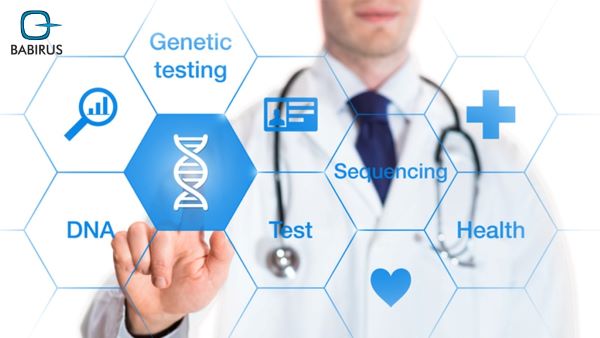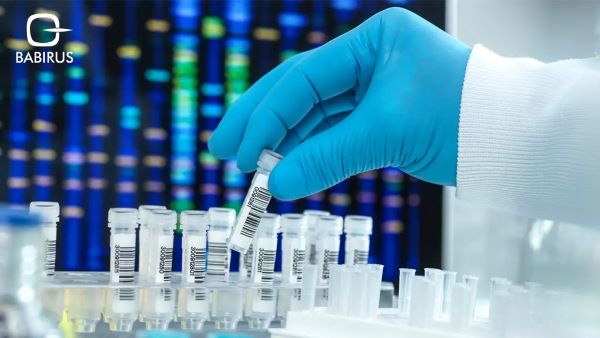The Future of Molecular Diagnostics

With all the developments in the healthcare field, we are seeing amazing advancements in molecular diagnostics future with new uses and implications, moreover, great impacts on the quality of represented medical services.
Additionally, the molecular diagnostics field is a basic player in upgrading from limited traditional treatments to precise, personalized medical interventions that are promising on all levels, including health conditions’ detection, treatment, and management.
Continue reading with us to discover all about the molecular diagnostics future, including details about next-generation sequencing, AI, and liquid biopsies.
Revolutionizing Diagnosis: The Power of Molecular Diagnostics
When talking about molecular diagnostics, then we are talking about a diagnostic technique that uses technologies to analyze biological markers in the genome and proteins.
The great capability of this method makes it more than popular to identifying diseases, predict their progression, and guide therapy selection.
Moreover, the innovations in molecular diagnostics like next-generation sequencing (NGS) and liquid biopsies in personalized medicine are now shaping the molecular diagnostics future, with developed disease management, and better diagnostic precision that directly impact the patient’s quality of life.
Gazing into the Future: Forecasting Trends in Molecular Diagnostics
All the work toward molecular diagnostics future improvement aims to redefine healthcare services with several emerging trends that benefit from the power of genomics, biotechnology, and artificial intelligence.
Especially, that these trends not only work to enhance the accuracy of diagnoses but also to expand the possibilities of treatments with advanced molecular diagnostics.
· Enhanced Precision and Personalized Medicine:
Because of all the advancement and hard work in genetic sequencing, personalized medicine is developing quickly and taking a more vital role in the molecular diagnostics future.
Simply because this technology shares a closer and clearer view of a patient’s genetic makeup with healthcare professionals, which allows them to develop customized treatments for each patient, and improve the effectiveness and the safety of treatments.
· Point-of-Care Diagnostics and Early Detection:
The main concept behind point-of-care (POC) molecular diagnostics is providing quick, in-location, and reliable medical testing solutions for healthcare professionals seeking timely decision-making in critical conditions.
This change in the molecular diagnostics future was brought about during the COVID-19 pandemic, with all the need for rapid testing that can be done almost anywhere, from the doctors’ office to the emergency room with fast and accurate results.
The great benefit of the POC concept in COVID-19 encouraged POC test development for other diseases.
· The Rise of Artificial Intelligence (AI):
AI is transforming the landscape of the world, including the molecular diagnostics future by making the possibility to analyze and understand vast amounts of medical data faster and more accurately than ever.
Moreover, AI in healthcare and diagnostic efforts helps uncover insights and patterns that might go unnoticed by human experts, leading to earlier and more accurate diagnoses.
To highlight the power of AI in molecular diagnostics, let us share with you an example about breast cancer. As a trained AI model may scan the mammograms faster, and more accurately than a radiologist, moreover, it can discover hidden or small signs of tumors.
However, we are not saying that AI will take over the radiologist’s place, but it will be a vital tool in helping doctors with a second, highly accurate opinion.
· Expanding Applications: Beyond Traditional Diagnostic Horizons
Although we are talking about the molecular diagnostics future from a medical and health-related point of view, but we cannot ignore the great applications of molecular diagnostics in different aspects of life.
Moreover, we are seeing a great expansion of molecular diagnostics into areas, such as:
- Public health surveillance.
- Environmental monitoring.
- Precision agriculture.
Each of these sectors benefits from the high specificity and sensitivity of molecular techniques, facilitating early detection and rapid response strategies that were once challenging.
Challenges and Opportunities of Molecular Diagnostics Future:
The molecular diagnostics future comes with its challenges, especially when considering the ethical and privacy considerations related to genetic testing, thus, ensuring data protection and ethical handling of genetic information is taking a high priority nowadays.
On the other hand, the molecular diagnostics future holds transformative potential for enhancing precision in personalized medicine. With innovations like:
- Point-of-care molecular diagnostics.
- Integration of AI in healthcare and diagnostics.
As these technologies provide fast and accurate diagnostics, that enable the development of tailored treatment strategies based on individual patient needs.
4 FAQs about Molecular Diagnostics Future:
If you want to understand the molecular diagnostics future better, then you need to read the answer to these most asked questions about the future of molecular diagnostics:
1. How Does Next-Generation Sequencing Impact Personalized Medicine?
NGS provides detailed insights into individual genetic blueprints, enabling healthcare providers to modify treatments based on the genetic makeup of each patient, leading to an increase in the efficacy and safety of medical treatments.
2. What Are the Benefits of Liquid Biopsies?
Liquid biopsies are considered a non-invasive alternative for diagnosing and monitoring diseases by detecting genetic mutations and alterations in DNA through a simple blood sample.
Moreover, this method is highly appreciated for cancer treatments, especially since it allows for real-time monitoring of tumor dynamics.
3. Can Molecular Diagnostics Contribute to The Prevention of Diseases?
Yes, one of the most promising aspects of molecular diagnostics is its potential to impact disease prevention.
As when identifying risk factors and predispositions to diseases at a molecular level, molecular diagnostics enables proactive management and preventative measures before the disease develops or progresses. Which is highly appreciated in managing hereditary diseases and conditions with a strong genetic component.
4. How Will Molecular Diagnostics Impact the Average Time to Diagnosis and Treatment for Chronic Diseases?
As molecular diagnostics technologies advance, they are expected to significantly reduce the time from symptom onset to diagnosis and treatment, particularly for chronic diseases.
This speed is due to the ability of molecular tests to quickly identify the genes and biomarkers associated with specific conditions, allowing for immediate and targeted treatment interventions.
Last of all,
The molecular diagnostics future promises a more precise and personalized approach to healthcare, with great advancements that are going to improve diagnostic accuracy and patient outcomes.
However, if you are planning to benefit from all the opportunities in molecular diagnostics future then you need to contact us and get the best healthcare machines and equipment.

